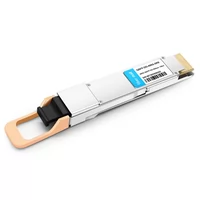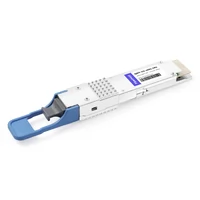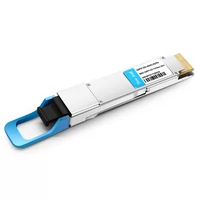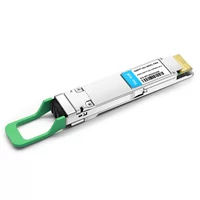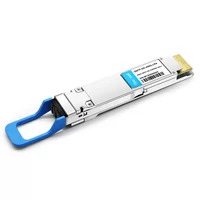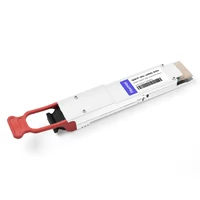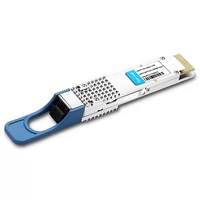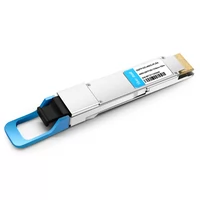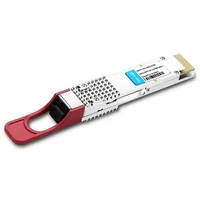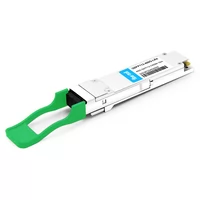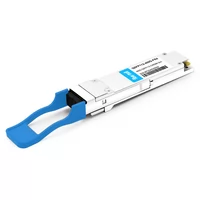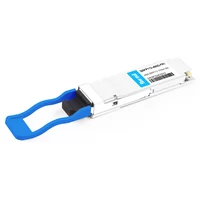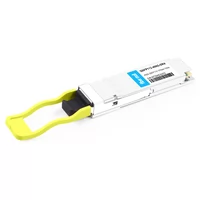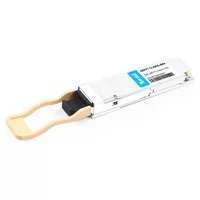Table of Contents
ToggleData Centers Evolving from 100G to 400G
Achieve up to four times the capacity on the same fiber infrastructure
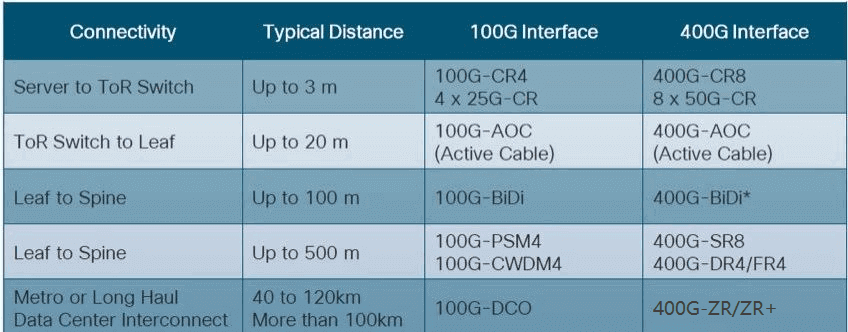
Note that 400G modules support 4x100GbE, 2x200GbE, and 1x400GbE.
Cisco Top-of-Rack (TOR) Switches
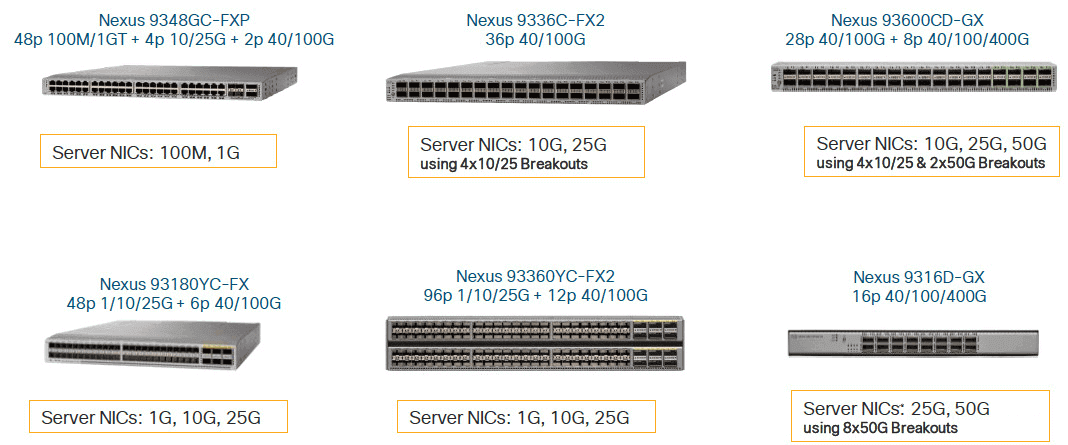
Cisco’s top-of-rack switches include models such as Nexus 9348GC-FXP, Nexus 9336C-FX2, Nexus 93600CD-GX, Nexus 93180YC-FX, Nexus 93360YC-FX2, and Nexus 9316D-GX. These switches have port speeds of 100M, 1G, 10G, 25G, and 50G.
Cisco Spine Switch
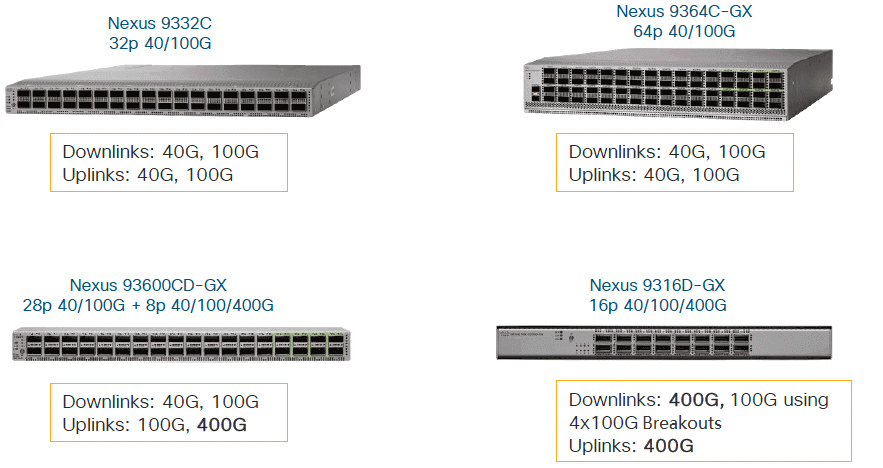
Cisco’s Spine switches are mainly Nexus 9332C, Nexus 9346C-GX, Nexus 93600CD-GX, Nexus 9316-GX, and other models—port rates 40G, 100G, 400G.
400GbE Leaf – Server Deployment Consideration
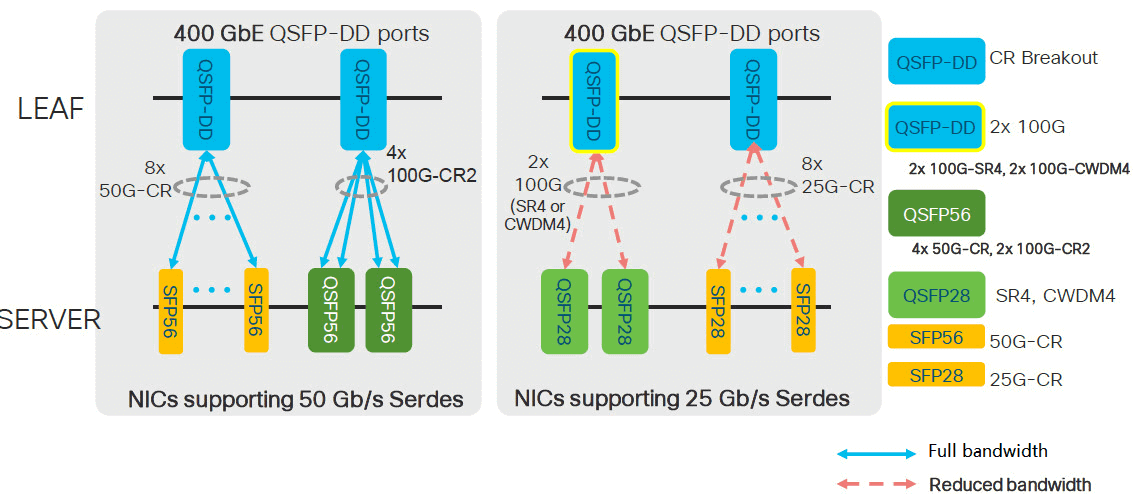
Leaf – Spine Deployment Consideration
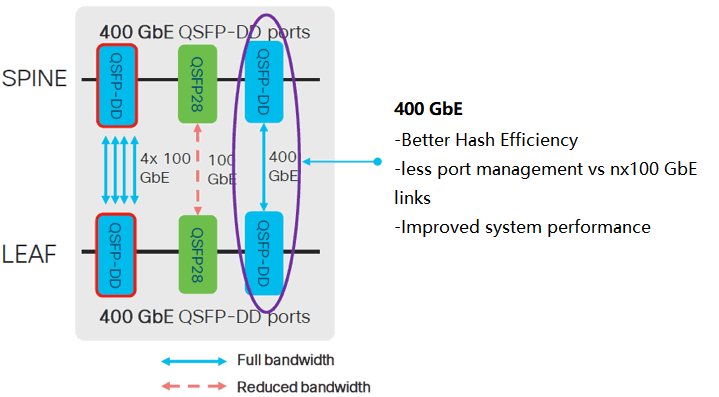
Fiber Technology Changes as Data Rates Increase
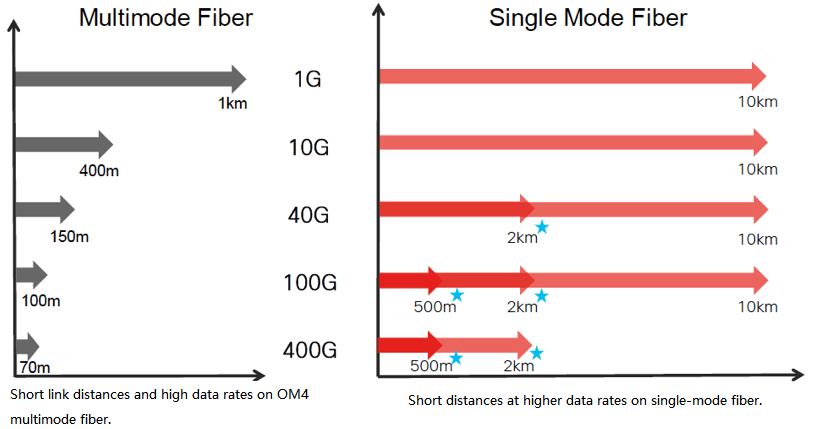
400GbE to 100GbE Backward Compatibility

400GbE QSFP-DD ports are backward compatible with 100GbE QSFP28 modules.
- 400 GbE can support 8x 50 GB/s interfaces
- The ASIC on the 50 GB/s interface can lower the speed to 25 GB/s (or 10 GB/s), which is compatible with the QSFP28’s 4×25 GB/s interface.
400GbE Optical Modules and Applications
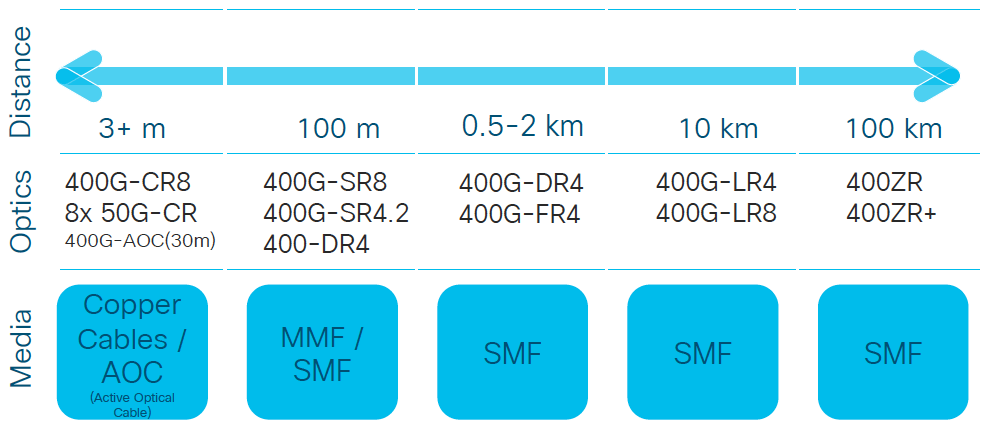
Cisco 400GbE Optical Module Roadmap
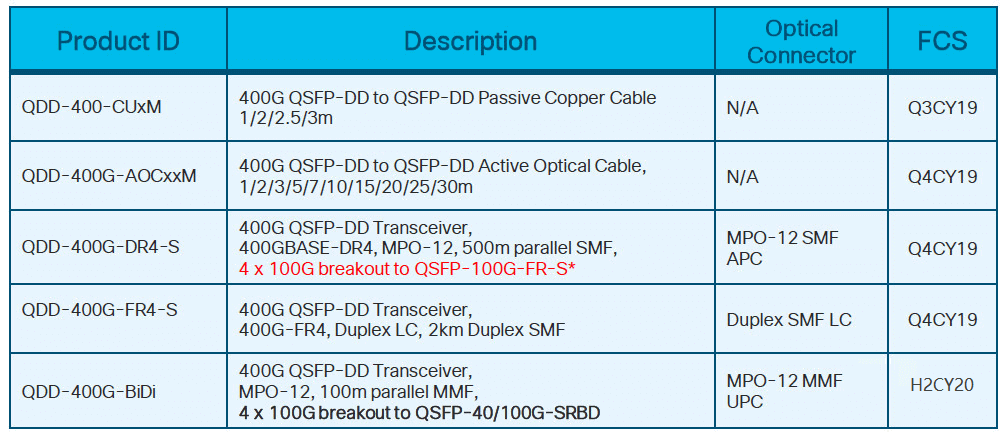
Cisco 400G Line Side Optical Module Technology Trends
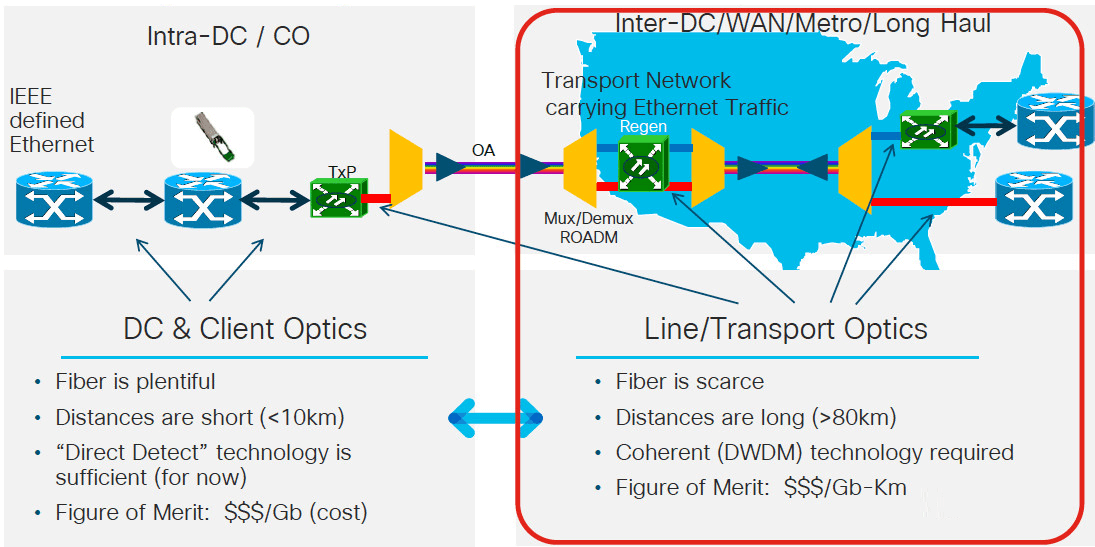
For line-side optical modules, the design goals are low cost, small size, and optimal performance.
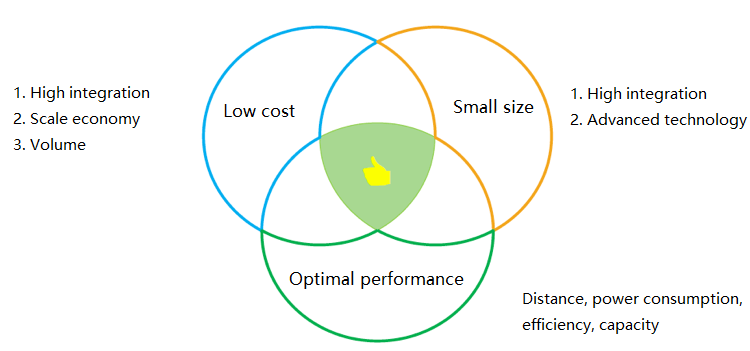
Then, how to make the optical transmission network in low-power transmission distance farther and faster? Two main technologies need to be applied:
- Coherent optical module technology
- Control plane and automation
Industry News
- Network optimization
- Fiber carrying capacity
- Bandwidth and cost
- Capacity and Density
- Control surface-SDN, WSON→SSON
- Optical module packaging, size reduction – promote the development of DCO-based pluggable optical modules
- Reach more than 1000km
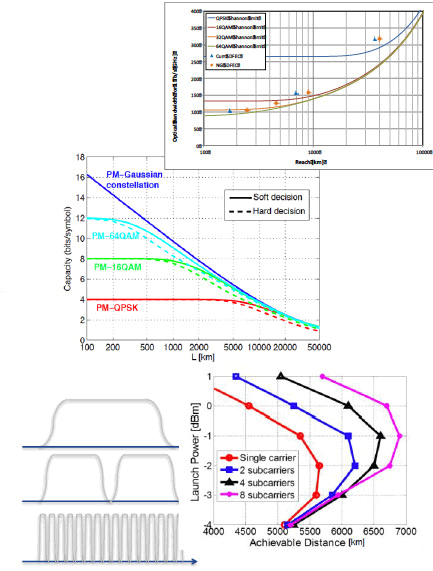
Coherent Detection – Drive Simplification

![]()
Coherent Optics Integrated Innovation Technology
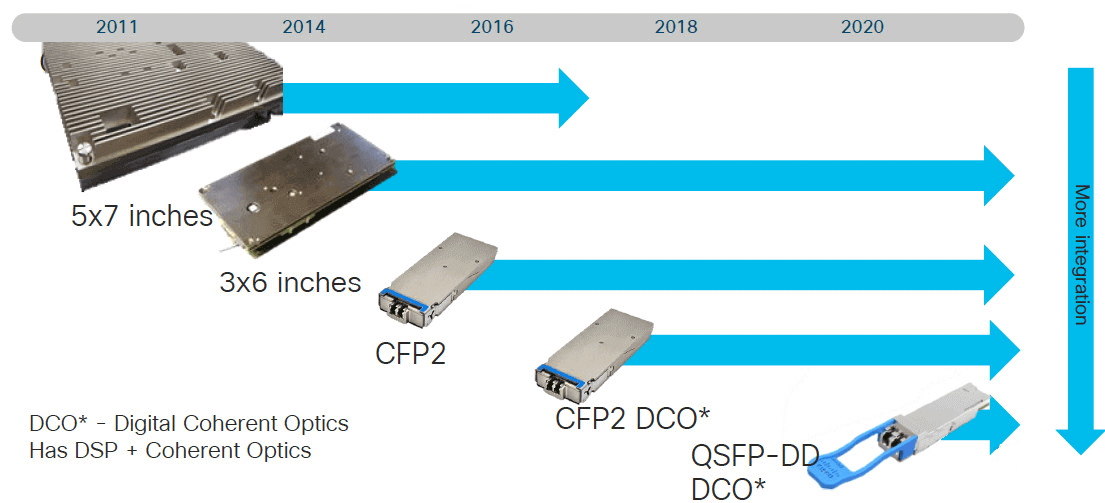
DCO: Digital Coherent Optics (DSP + Coherent Optics)
Pluggable Coherent Optical Modules
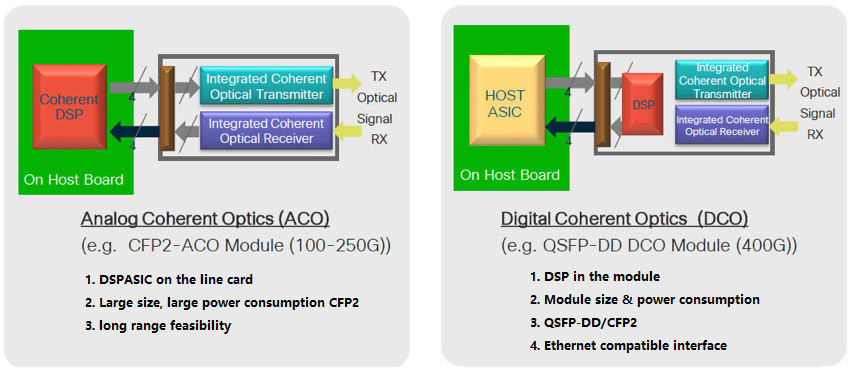
Optical Transport Market Trends: Impact
Traditional optical transport networks take advantage of the higher spectral efficiency in complex transport networks
-Multi-degree ROADMs with CDC
-Flexible spectrum, embedded optics/transponders, advanced FEC
-Advanced control plane (SSON)
-High flexibility for infrastructure
Increased need for simplified network topology and operational models.
-400GZR / ZR+
-Point-to-point connectivity
-ROADM-Less
-DWDM direct connection to switches/routers
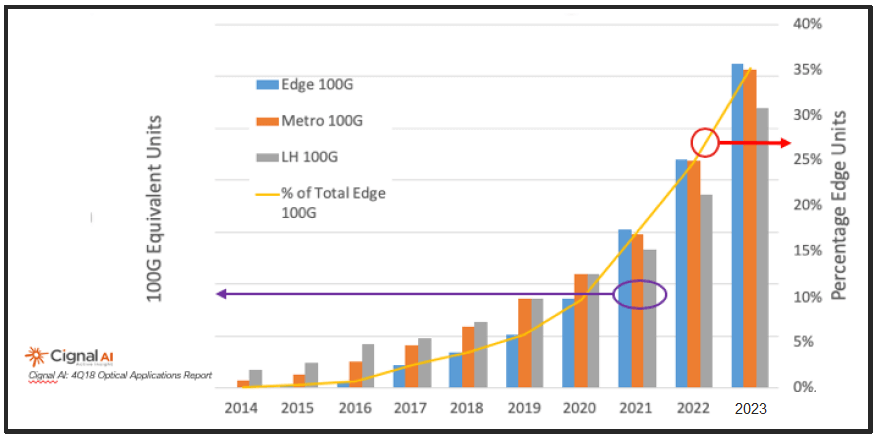
Client and Line Side Optical Module Technology
To meet the needs of the network, the key technologies and integration options that have been applied in the market are as follows:
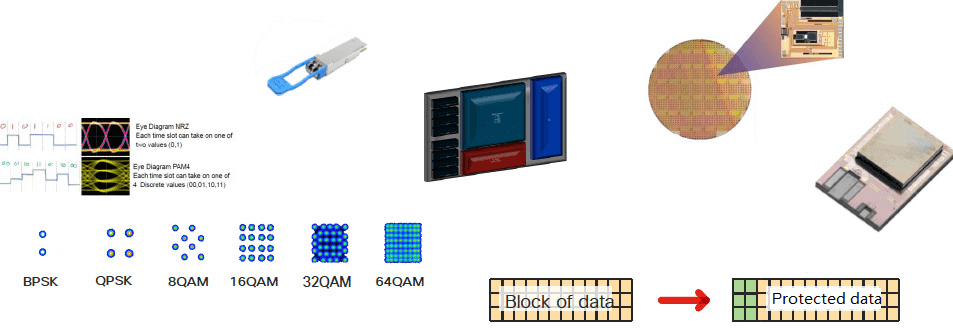
Why Making Modules Pluggable Matters
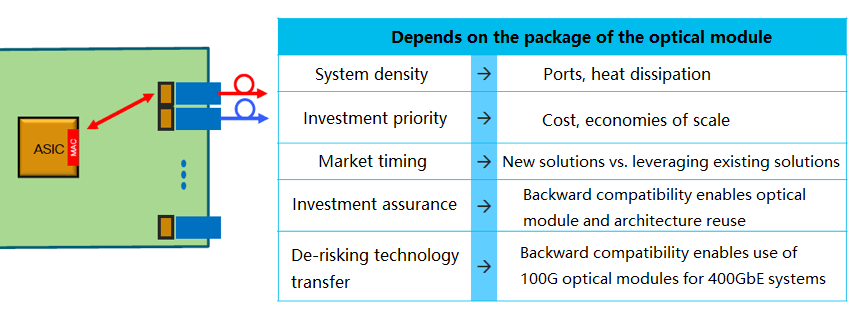
400 GbE: Key Solution Innovations
Three major innovations driving the technology shift:
- QSFP-DD pluggable modules
- 100 GB/s per wavelength
- Fast optical direct detection modulation
- Reduced component count (cost/power)
- Follow the SerDes technology advancement
- Coherent optics to pluggable modules
- OIF 400G ZR/ZR+ coherent DWDM up to 1000km
- Advances in CMOS technology (7nm) enable the adoption of QSFP-DD
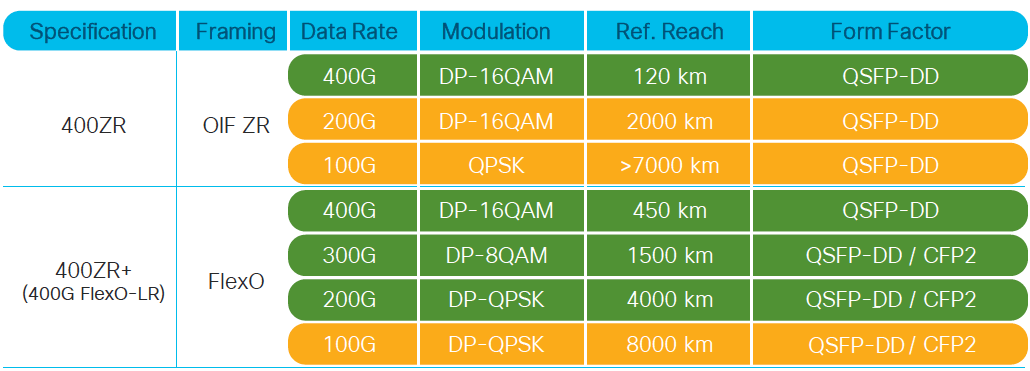
QSFP-DD 400GZR:80~120km, <15W
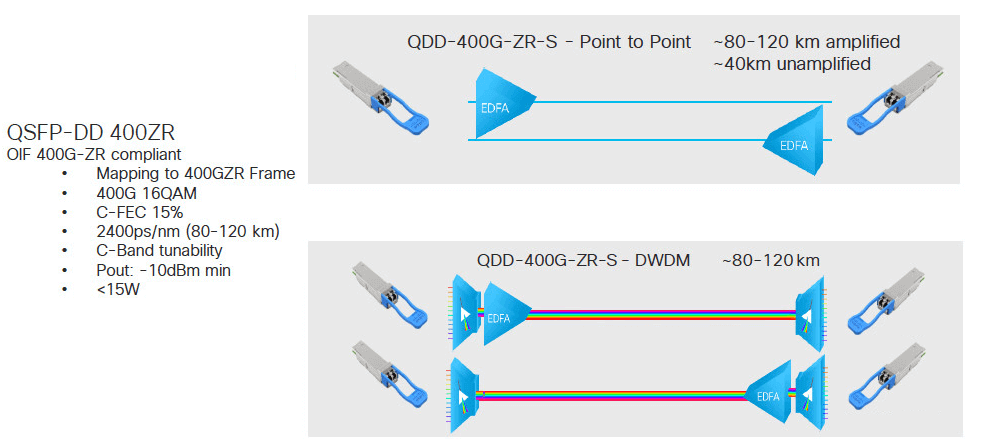
QSFP-DD 400GZR+: <450km, <18W
QSFP-DD 400G-Metro: <1500km, <21W
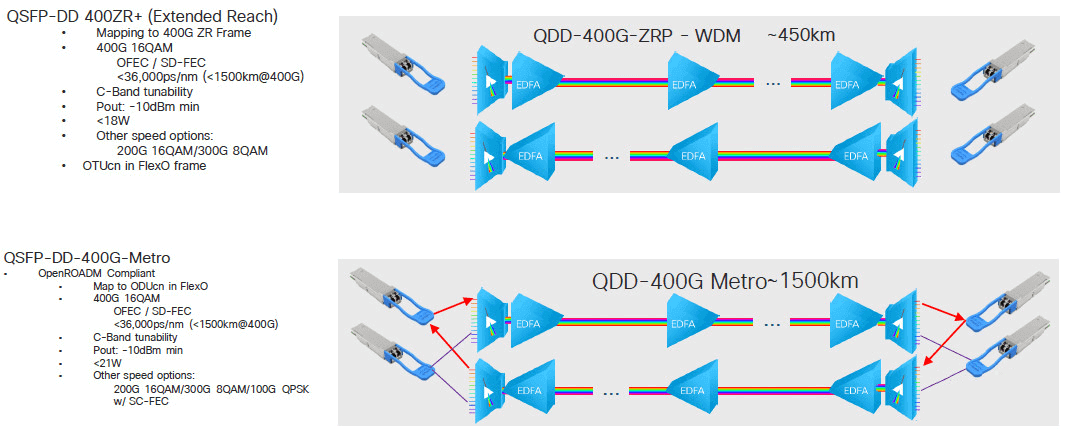
Two Paths of Coherent Technology Implementation
DCO&Embedded
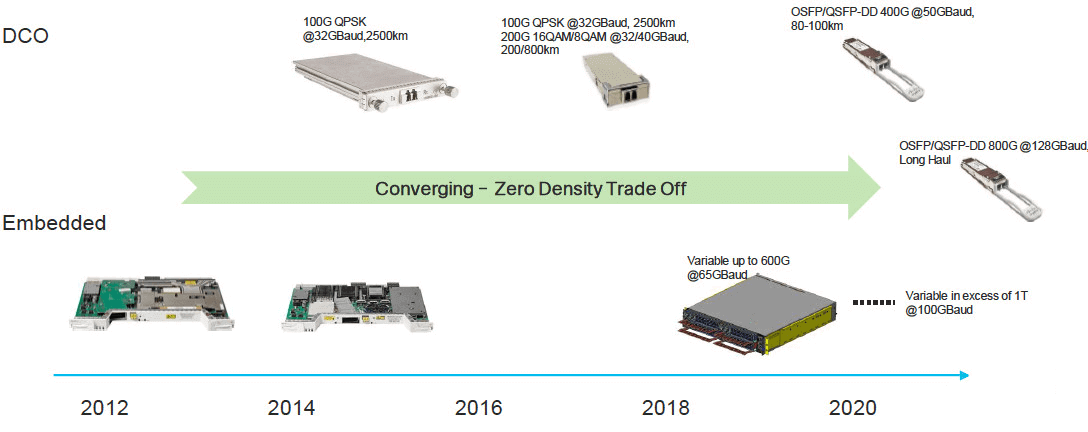
Transmission Distance and Packaging
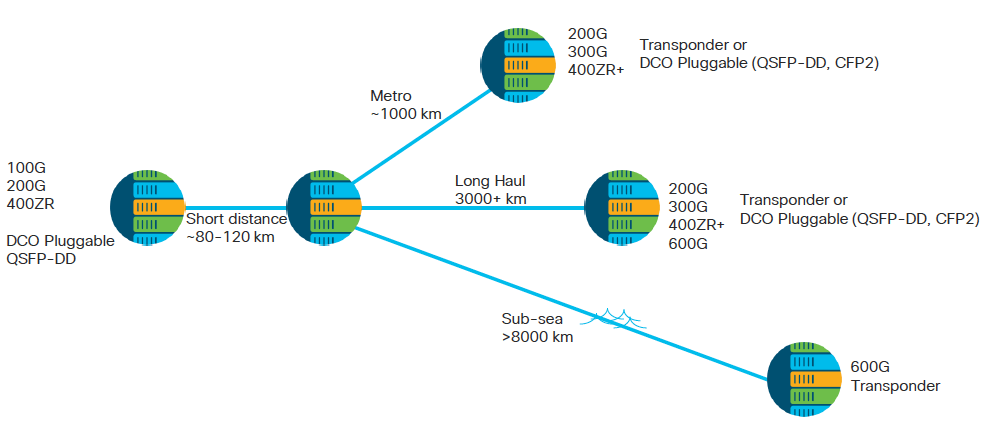
Cisco Optical Module 400G and Beyond 400G Roadmap
Ethernet roadmap: 400GbE high-volume applications in 2020
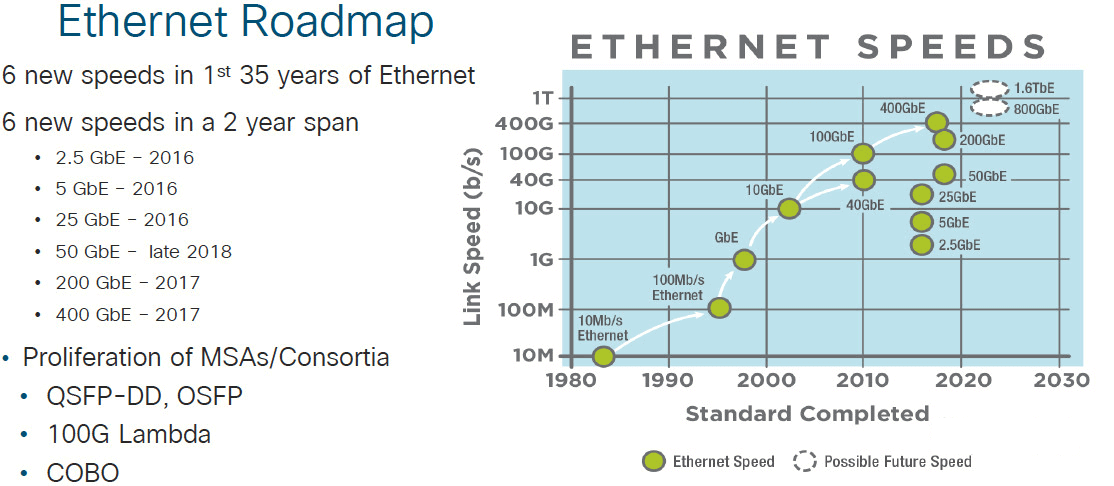
ASIC: rate continues to increase (25.6Tb/s in 2020)
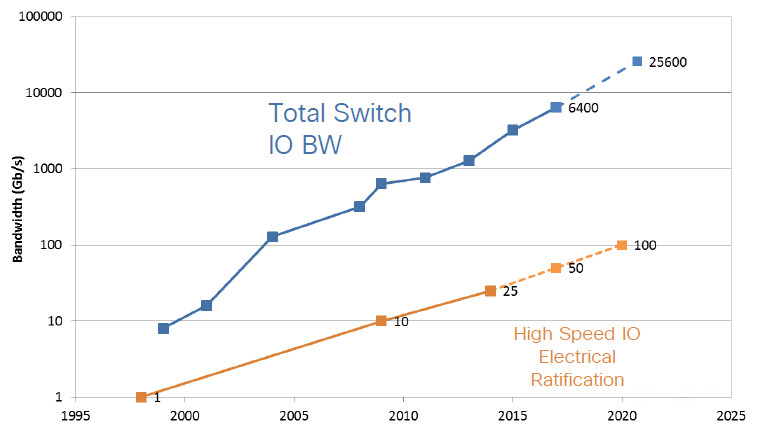
Optical module technology
Package size – maintain/increase port density, power consumption reduction – maintain/increase port density, low cost.

Only a unified package on the client side to reduce costs can accelerate the industrialization of 400G optical module applications.
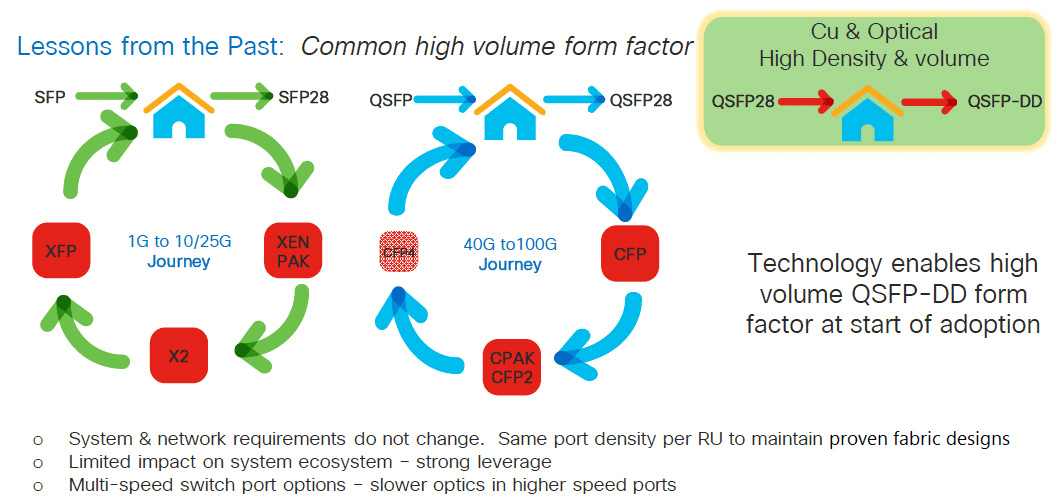
The following figure shows the great advantage of using QSFP-DD modules in terms of size.
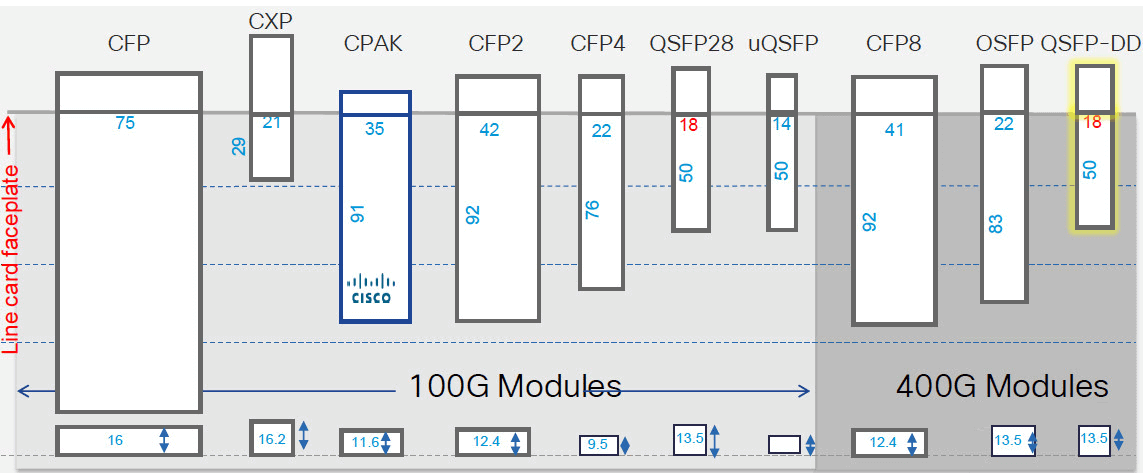
Thermal performance of QSFP-DD
- The thermal dissipation capacity increases from 3.5W of QSFP28 to 20W
- Advanced cage design
- Advanced heatsink design
- Advanced heatsink fixing technology
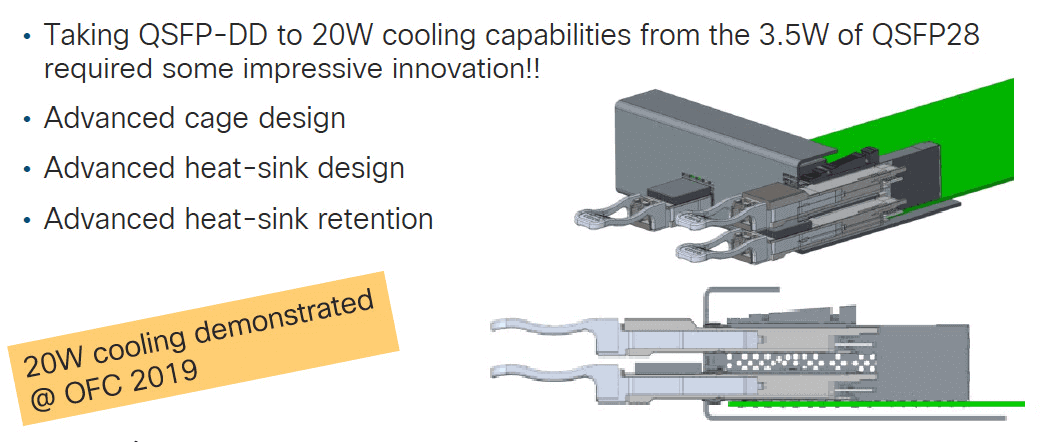
QSFP-DD Enhanced Heat Sink Performance
1) Improved heat sink capable of addressing 20W of power consumption
2) Compatible with MSA
3) Adapt to various QSFP-DD ports
4) Advanced cage and heat sink design
In 1U equipment, when the optical module power consumption is 21W, the temperature rise can be controlled within 25℃.
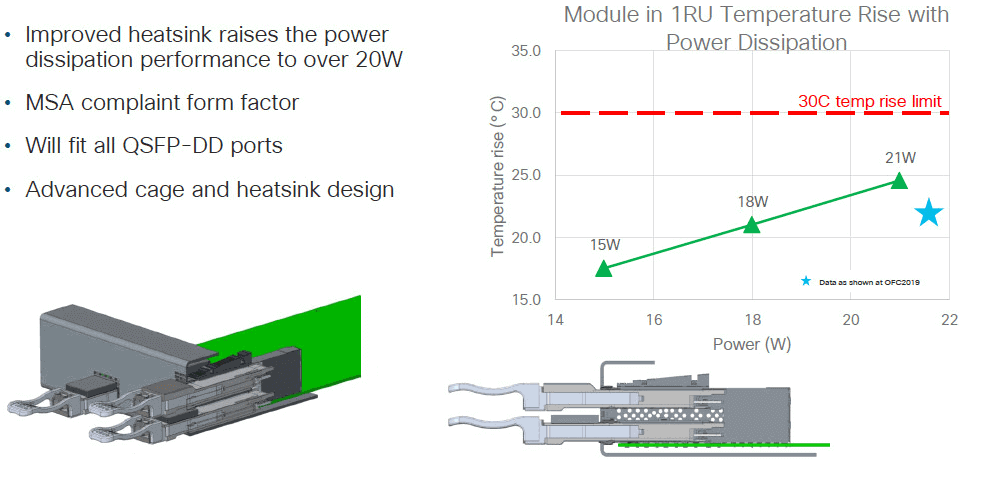
Switching rate development trend
- 400G is the highest rate at present
- The direction of development is higher density and higher speed.
- SERDES reaches 100Gb/s
- ASIC reaches 25.6Tb/s and 51.2Tb/s
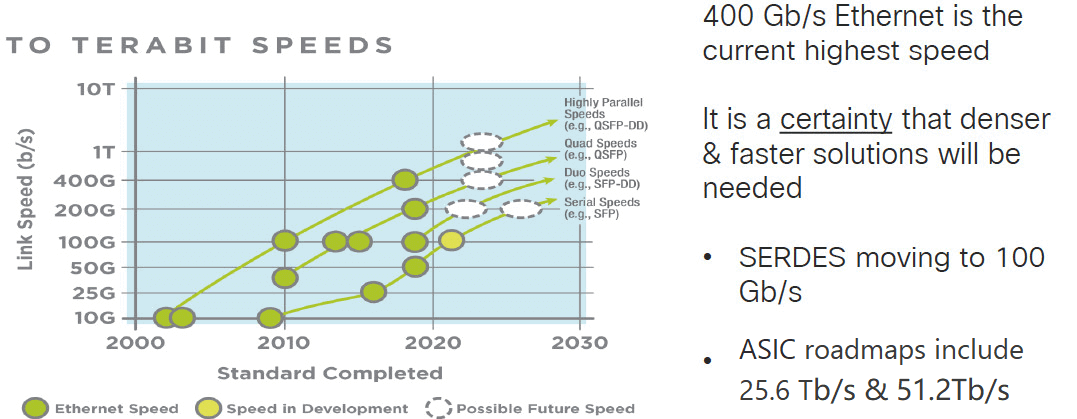
Industry Development
1)DSP and Coherent technology will enable
- 800G, 1T, and beyond
- Technology is not only used in DWDM, but also gray light
- Focus shifts from performance to operator interfaces and pluggables
2)More interop between vendors
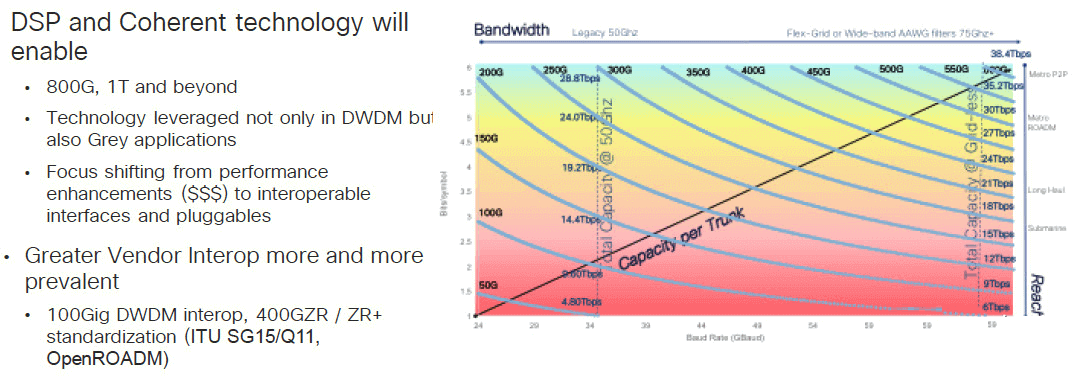
Efficiency Improvement – Lower Energy Consumption for the Same Bandwidth
As seen in the figure on the left, the same 1Tb/s bandwidth, using QSFP-DD, energy consumption of 30W, while CFP reaches 240W.
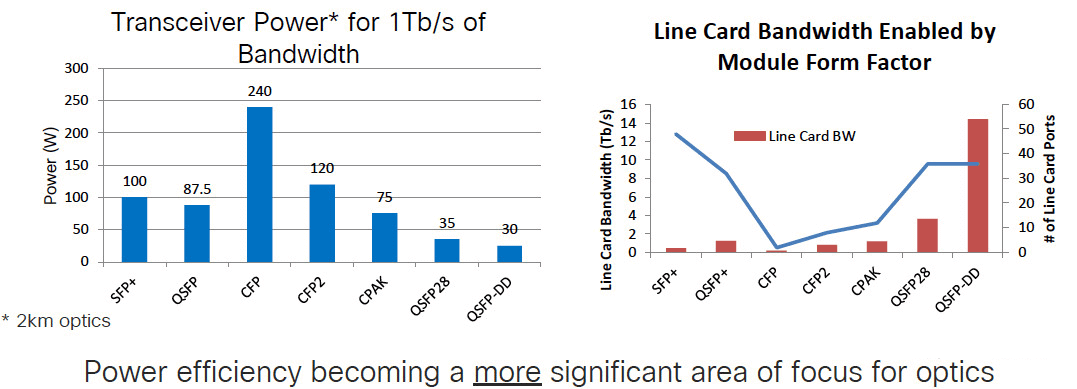
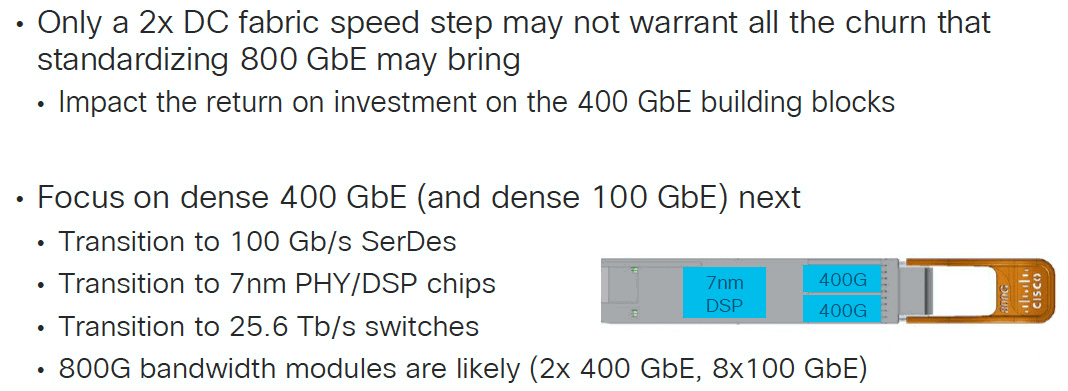
Achieving higher density 400GbE
Route: QSFP28→QSFP56-DD→QSFP112→QSFP112-DD
Heat dissipation: feasible
100Gb/s tested well; surface mount or Flyover connection optional
7nm or 5nm; silicon optical technology continues to mature
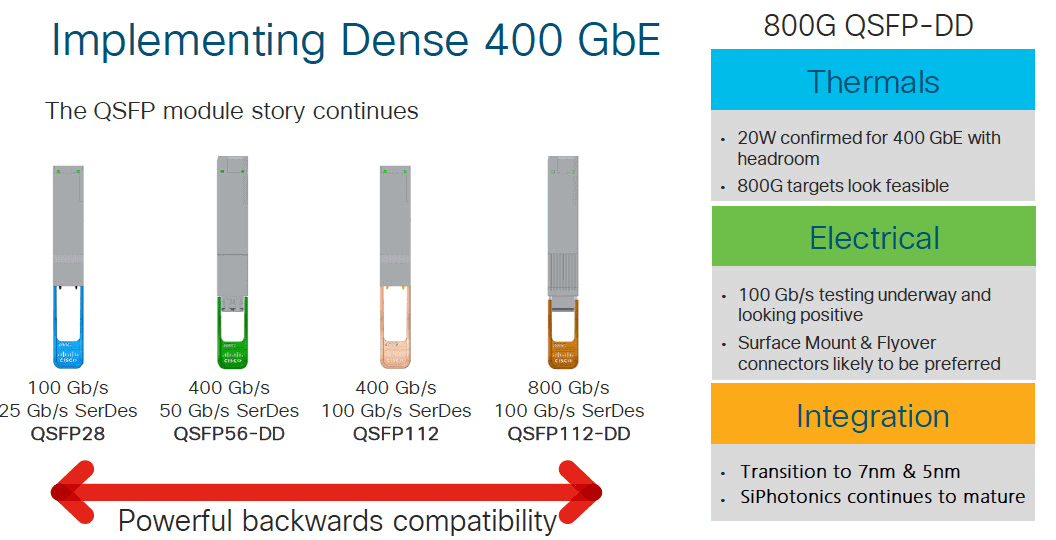

Serdes=power consumption
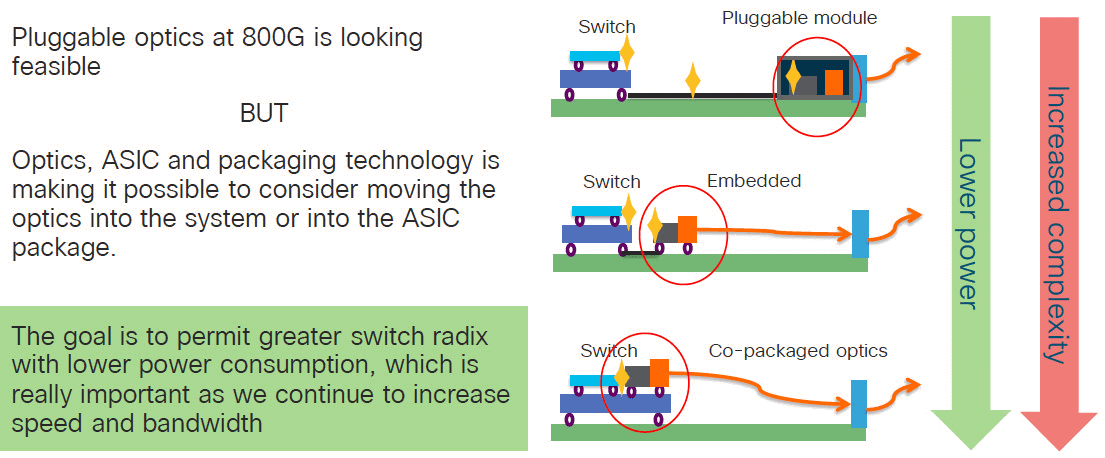
Related Products:
-
 QSFP-DD-400G-SR8 400G QSFP-DD SR8 PAM4 850nm 100m MTP/MPO OM3 FEC Optical Transceiver Module
$149.00
QSFP-DD-400G-SR8 400G QSFP-DD SR8 PAM4 850nm 100m MTP/MPO OM3 FEC Optical Transceiver Module
$149.00
-
 QSFP-DD-400G-DR4 400G QSFP-DD DR4 PAM4 1310nm 500m MTP/MPO SMF FEC Optical Transceiver Module
$400.00
QSFP-DD-400G-DR4 400G QSFP-DD DR4 PAM4 1310nm 500m MTP/MPO SMF FEC Optical Transceiver Module
$400.00
-
 QSFP-DD-400G-XDR4 400G QSFP-DD XDR4 PAM4 1310nm 2km MTP/MPO-12 SMF FEC Optical Transceiver Module
$580.00
QSFP-DD-400G-XDR4 400G QSFP-DD XDR4 PAM4 1310nm 2km MTP/MPO-12 SMF FEC Optical Transceiver Module
$580.00
-
 QSFP-DD-400G-FR4 400G QSFP-DD FR4 PAM4 CWDM4 2km LC SMF FEC Optical Transceiver Module
$500.00
QSFP-DD-400G-FR4 400G QSFP-DD FR4 PAM4 CWDM4 2km LC SMF FEC Optical Transceiver Module
$500.00
-
 QSFP-DD-400G-LR4 400G QSFP-DD LR4 PAM4 CWDM4 10km LC SMF FEC Optical Transceiver Module
$600.00
QSFP-DD-400G-LR4 400G QSFP-DD LR4 PAM4 CWDM4 10km LC SMF FEC Optical Transceiver Module
$600.00
-
 QSFP-DD-400G-ER4 400G QSFP-DD ER4 PAM4 LWDM4 40km LC SMF without FEC Optical Transceiver Module
$3500.00
QSFP-DD-400G-ER4 400G QSFP-DD ER4 PAM4 LWDM4 40km LC SMF without FEC Optical Transceiver Module
$3500.00
-
 QSFP-DD-400G-LR8 400G QSFP-DD LR8 PAM4 LWDM8 10km LC SMF FEC Optical Transceiver Module
$2500.00
QSFP-DD-400G-LR8 400G QSFP-DD LR8 PAM4 LWDM8 10km LC SMF FEC Optical Transceiver Module
$2500.00
-
 QSFP-DD-400G-PLR4 400G QSFP-DD PLR4 PAM4 1310nm 10km MTP/MPO-12 SMF FEC Optical Transceiver Module
$1000.00
QSFP-DD-400G-PLR4 400G QSFP-DD PLR4 PAM4 1310nm 10km MTP/MPO-12 SMF FEC Optical Transceiver Module
$1000.00
-
 QSFP-DD-400G-ER8 400G QSFP-DD ER8 PAM4 LWDM8 40km LC SMF FEC Optical Transceiver Module
$3800.00
QSFP-DD-400G-ER8 400G QSFP-DD ER8 PAM4 LWDM8 40km LC SMF FEC Optical Transceiver Module
$3800.00
-
 QSFP112-400G-LR4 400G QSFP112 LR4 PAM4 CWDM 10km Duplex LC SMF FEC Optical Transceiver Module
$1500.00
QSFP112-400G-LR4 400G QSFP112 LR4 PAM4 CWDM 10km Duplex LC SMF FEC Optical Transceiver Module
$1500.00
-
 QSFP112-400G-FR4 400G QSFP112 FR4 PAM4 CWDM 2km Duplex LC SMF FEC Optical Transceiver Module
$750.00
QSFP112-400G-FR4 400G QSFP112 FR4 PAM4 CWDM 2km Duplex LC SMF FEC Optical Transceiver Module
$750.00
-
 QSFP112-400G-FR1 4x100G QSFP112 FR1 PAM4 1310nm 2km MTP/MPO-12 SMF FEC Optical Transceiver Module
$1200.00
QSFP112-400G-FR1 4x100G QSFP112 FR1 PAM4 1310nm 2km MTP/MPO-12 SMF FEC Optical Transceiver Module
$1200.00
-
 QSFP112-400G-DR4 400G QSFP112 DR4 PAM4 1310nm 500m MTP/MPO-12 with KP4 FEC Optical Transceiver Module
$650.00
QSFP112-400G-DR4 400G QSFP112 DR4 PAM4 1310nm 500m MTP/MPO-12 with KP4 FEC Optical Transceiver Module
$650.00
-
 QSFP112-400G-SR4 400G QSFP112 SR4 PAM4 850nm 100m MTP/MPO-12 OM3 FEC Optical Transceiver Module
$450.00
QSFP112-400G-SR4 400G QSFP112 SR4 PAM4 850nm 100m MTP/MPO-12 OM3 FEC Optical Transceiver Module
$450.00

